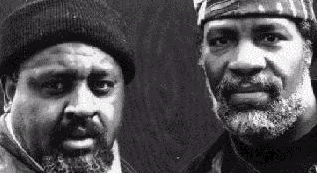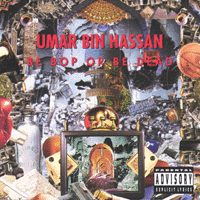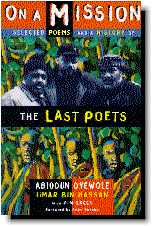
Umar Bin Hassan and Abiodun Oyewole

Umar Bin Hassan and Abiodun Oyewole
Hopefully, you have just read poems of THE LAST POETS. Now you can read their biography below, but while you are doing it why don't you hear them:
1. Search the internet for the radio station KCRW. Find the link for the program "Chocolate City". Once there find their Last Poets show (taped February 14, 2001).
Last Poets were rappers of the civil rights era. Along with the changing domestic landscape came the New York City-hip group called The Last Poets, who used obstreperous verse to chide a nation whose inclination was to maintain the colonial yoke around the neck of the disenfranchised.
Shortly after the death of Martin Luther King, The Last Poets were born. David Nelson, Gylan Kain, and Abiodun Oyewole, were born on the anniversary of Malcolm X's birthday May 19, 1968 in Marcus Garvey Park. They grew from three poets and a drummer to seven young black and Hispanic artists: David Nelson, Gylan Kain, Abiodun Oyewole, Felipe Luciano, Umar Bin Hassan, Jalal Nurridin, and Suliamn El Hadi (Gil Scott Heron was never a member of the group). They took their name from a poem by South African poet Willie Kgositsile, who posited the necessity of putting aside poetry in the face of looming revolution.
"When the moment hatches in time's womb there will be no art talk," he wrote. "The only poem you will hear will be the spearpoint pivoted in the punctured marrow of the villain....Therefore we are the last poets of the world."
|
|
|
The Last Poets has brought together music and the word. Like Haki Madhubuti (Don L. Lee), they are/were modern day griots expressing the nation- building fervor of the Black Panthers in poems written for black people. As the great poet Amiri Baraka (LeRoi Jones) says, "The Last Poets are the prototype Rappers... the kina nigger you don never wanna meet!" They teach what America does to its Black men, what Black men do to themselves, and WHY!
Novelist/essayist Darius James, in his book "That's Blaxploitation!" (St. Martin's Griffin, 1995) recalled the impact of the Poets at their birth.
In 1970 the Last Poets released their first album and dropped a bomb on black Amerikkka's turntables. Muthafuckas ran f'cover.
Nobody was ready.
Had em scared o' revolution. Scared o' the whyte man's god complex. Scared o' subways. Scared o' each other. Scared o' themselves. And scared o' that totem of onanistic worship -- the eagle-clawed Amerikkkan greenback! The rhetoric made you mad. The drums made you pop your fingers. And the poetry made you sail on the cushions of a fine hashish high.
Most importantly, they made you think and kept you "correct" on a revolutionary level.
We all connected. 'Cause it was a Black communal thing. Like the good vibes and paper plate of red-peppered potato salad at a neighborhood barbecue. The words and the rhythms were relevant. We joined together around the peace pipe and the drum. And when it came to the rhythms of the drums, the drums said, "Check your tired-ass ideology at the door."
With withering attacks on everything from racists to government to the bourgeoisie, their spoken word albums preceded politically laced R&B projects such as Marvin Gaye's What's Going On and foreshadowed the work of hard-hitting rap groups such as Public Enemy. Their classic poems Niggers are scared of Revolution, This is Madness, When the Revolution Comes (not to be confused with Oyewole's modern version linked above), and Gashman were released on their two record albums Last Poets (1970) and This Is Madnesss (1971). I, the maker of this webpage, learned the poems of both albums from the lyrics on the back.
During their late 60s and early 70s they connected with the violent factions of the SNCC (Student Non-Violent Coordinating Committee), the SDS (Students for a Democratic Society), and the Black Panther party. They went through confrontations with the FBI and police, and went arrests for robbing the Ku Klux Klan and various other ventures with Revolution in mind. Abiodun Oyewole received a 12-to-20-year jail sentence, but served less than four years.
Like Oyewole, Umar Bin Hassan was able to overcome the urban social maladies of a broken home, child abuse, a musician-father doing jail time, the dog-eat-dog world of public housing in Akron Ohio, and his own crack addiction. Hassan dispenses with the eloquence of classic English verse, for the gritty, in-your-face cadence of the 'hood.
They also fought each other and split into two groups. One, including Jalal Nuriddin, who wrote Wake Up Niggers, and Suleiman el-Hadi, was known as "The Last Poets" and the other, including Abiodun Oyewole and Umar Bin Hassan, while also original members, was billed as "Formerly of the Last Poets." It was a legal dispute, fundamentally, and for years there was talk of reconcilation. Nuriddin and el-Hadi also were active, though mostly in the UK (Nuriddin has been based in London for some years). In an early 90's Paris where Umar Bin Hassan was preparing for a Last Poet concert, Jalal mysteriously appeared and stabbed Hassan in the throat. Attempting to learn their own lessons, at present only Oyewole and Hassan (shown at the top of this page) remain of the original Last Poets in the group, and have the right to call themselves that title.

The Last Poets made four albums. Oyewole, at times with Hassan, at time without, made a number of others. On the albums, there are many special guests. Bill Laswell has appeared with the group during much of the 90s. They participated in the 1994 Lollapalooza tour; performed in John Singleton's "Poetic Justice" film and Holy Terror has Senegalese drummer Aiyb Dieng and his longtime collaborator, former Coltrane protege Pharoah Sanders to add some fireworks on sax. Hassan has the CD Be Bop or Be Dead. Anyway, a mid 90s performance of Oyewole and Hassan can be heard on the Stolen Moments: Red Hot and Blue compilation, which also ran on PBS as a video. On the fourth album since 1993,Time Has Come, Chuck D, co-founder of Public Enemy appears.
The full Last Poets story, as well as poetry, can be found in the book On a Mission: Selected Poems and a History of The Last Poets by Abiodun Oyewole, Umar Bin Hassan written with music journalist Kim Green
Buy this book

it's sold all over the web.
Abiodun Oyewole has had a number of projects not under the Last Poets name, such as the CD 25 Years. Oyewole, spent 15 years in the New York school system, also taught at Columbia University. David Nelson is a Christian Minister, Felipe Luciano is a newscaster New York. But the Last Poets, with Oyewole and Hassan, performed in Buffalo in 1997. According to Oyewole:
"We're no more 'godfathers of spoken word' than the man in the moon; it comes in a package from the motherland. But we accept there is work out there that we can do. People need to see a focal point, a beacon, and we don't have no problem with shining."
Selected Last Poets Discography
The used to be real audio "streaming sound" songs from the CD 25, but tunes.com has sold out. These are just links to rollongstone.com. If I ever find streaming audio, I'll link to it.
We had help from Ellen-Cathryn Nash who said,
"There is an error on your Last Poets bio page: It is Bill Laswell, not David Laswell. Bill is a producer who worked with the Poets and Jalal has appeared on several of Bill's Axiom releases. I worked at Celluloid Records until the company closed and got to know both Jalal and Suliman. Additionally, Freedom Express was not released by Celluloid in 1991 - the company was closed by then.:
go to
back to Snally Gaster's